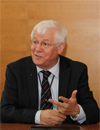 |
||
|
Russia Should Boost Military Ties With Iran Amid Standoff With West RIA Novosti, PUBLISHED 05.04.2014 Iran may become Moscow's number one choice in Russia's impending search for a new "reliable partner" in global defense and security affairs amid worsening ties with the West, a Russian military expert said on Friday. Ties between Moscow and the West plunged to record lows in recent weeks by disagreements over the status of Crimea, which rejoined Russia after 60 years as part of Ukraine last month. In the ongoing diplomatic strife that followed, NATO froze all practical aspects of its military cooperation with Russia earlier this week, while the US and EU imposed sanctions on Russian officials. In November 2013, the sides agreed on a set of temporary measures to limit the Islamic Republic's nuclear activities pending a broader agreement. Other news: Hungary Enacts Law to Expand Nuclear Power With Russian Aid HungaryТs president has signed a bill into law to expand a nuclear power plant in the country with Russian assistance. Hungary Lawmakers OK Russia Nuclear Plant Deal Russia will provide Hungary a loan of up to 10 billion euros ($13.5 billion) - around 80 percent of construction costs. Russia to Lend Hungary $13.7Bln for Nuclear Plant The deal was announced during a state visit to Moscow by Hungarian Prime Minister Viktor Orban and was hailed by Russian President Vladimir Putin. |
Hero of the day 
We are currently working with the Nuclear Decommissioning Authority (NDA) on this approach, which was submitted in response to their February 2012 call for alternative proposals. We appreciate that the UK is in the early stages of their policy development activities and are pleased to be involved in such important work. INTERVIEW
Yanko Yanev OPINION
Joint Plan of Action |

